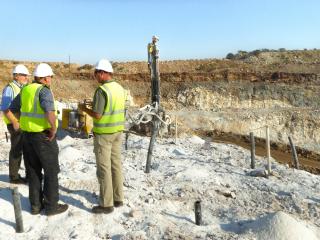The challenge of managing soil acidity through tailored lime treatments continues to be an international dilemma, as two Western Australian scientists discovered during a recent study tour of South Africa.
Department of Primary Industries and Regional Development senior research scientist Chris Gazey, has just returned from a four week tour of the country with Premier’s Agricultural Entrepreneurship Program Award recipient, Aglime of Australia general manager Steve Carr.
The pair visited more than 10 farms, five lime mine sites, numerous fertiliser manufacturers and agribusinesses and attended the massive NAMPO Harvest Day, which attracts machinery dealers from around the world.
Mr Gazey said the tour provided a good opportunity to network with international farmers, scientists and agribusinesses working on ameliorating soil acidity.
“The soil constraints facing South African landholders were similar to those in Western Australia, despite some differences in soil types,” Mr Gazey said.
“In many cases, WA landholders are ahead of the game, particularly with soil sampling to depth, although we don't sample topsoils as intensively. A key difference is that WA growers have access to affordable, natural sources of high quality agricultural lime.”
The pair were particularly interested in viewing several machinery prototypes that were being developed to incorporate or mix lime below the soil surface.
Dr Carr said the South Africans and other countries appeared to be tackling the same issue as WA agribusinesses of how to best incorporate lime into the soil to mitigate acidity.
“While top dressing remains the most popular method of applying lime, local and international research has shown there are benefits to be gained by distributing the lime in the soil profile and placing it where it can react and neutralise the acidity below the soil surface more quickly,” Dr Carr said.
“During the tour we saw several prototypes and concept designs to achieve that, such as modified tynes and shafts, however, there was no ‘single bullet’ solution.”
Dr Carr said there were also many discussions about when best to integrate lime incorporation into the farming system.
“The thinking seemed to be including lime incorporation as part of a paddock renovation strategy, which could be applied during deep ripping while addressing soil compaction and water repellence issues,” he said.
“The next step is to gain a better understanding of how incorporated lime creates pathways in the soil for roots, assessing root growth responses at 20 to 30 and 40 centimetres, and developing appropriate machinery to do that for WA soils.”
The department has achieved good results from the deep placement of lime by direct injection using modified farm scale machinery, although the process was time consuming and expensive.
More information about the department’s research activities is available at the department website.

Media contacts:
Jodie Thomson/Megan Broad, media liaison +61 (0)8 9368 3937
